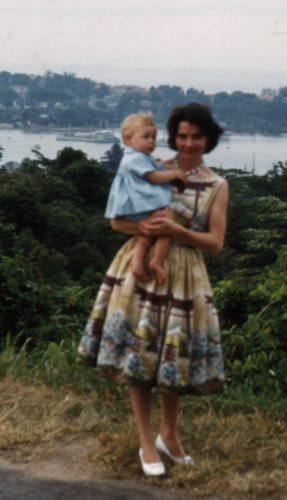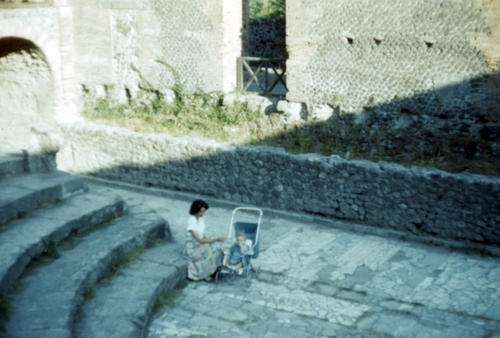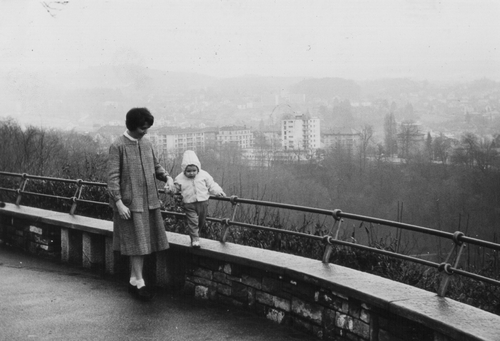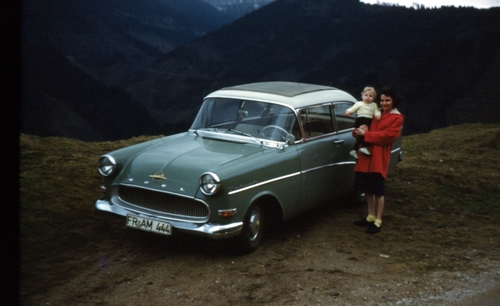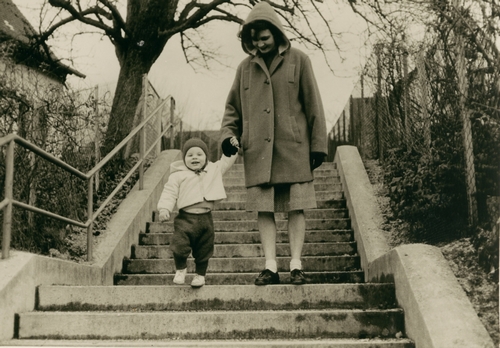Chapter 26 WANDERING THE WIDE WORLD OVER
At last we were away. Once on board the "Fairsky" steaming north, I had time to think about the coming year. The grandparents must adore Peter, almost a year old, trying to talk and walk. Everyone loved him, he was friendly and alert and easily distracted from doing those things which annoy. Bright blue eyes, fair curly hair, a responsive disposition and a ready smile made him the object of attention wherever we went. Bill lapped up the admiration given to his son.
Bill had sent money for a car, not enough for the Mercedes which he had at first suggested to his stepfather, but at least we would be mobile. Later we could move on to England and I could get a job too, to enable us to see more of Europe before returning home. In the meantime he could get on with his correspondence course lessons which I had packed in our cabin luggage and suggested that Bill take up his studies but he preferred not.
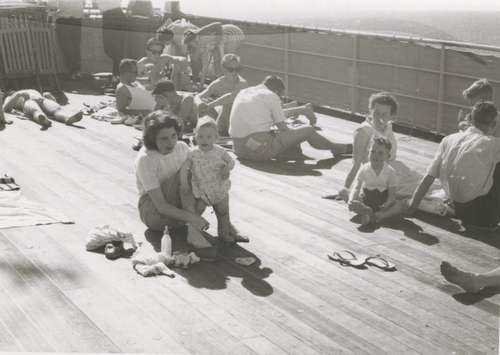
I was mostly too exhausted to participate fully in shipboard activities. But I made Peter an outfit for the fancy dress, also for myself for the "mad hatters". The four weeks on board ship went slowly. It was a full time job watching the toddler, who had his first birthday at sea. I dug deep into my memory and experimented until I could work out how to make a rabbit out of a handkerchief to entertain him and sat him on my knee to play "This is the way the ladies ride" ending with spreading my knees and letting him fall through. When he was asleep I sewed things I had prepared before leaving. Children's food was supplied at separate meals. I mashed what I expected him to eat. There was also canned baby food and bottles of milk if he happened to be asleep at meal time. And an area for children to play, where he and I spent some time each day. We explored everything on the ship which was not out of bounds.
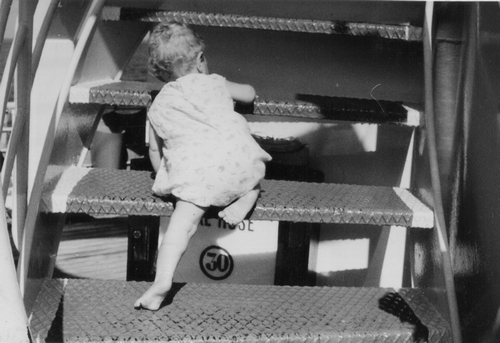
Bill was always insistent about going to the dances although we didn't dance much which was disappointing. I was very taken with the signature tunes of the band which were "O Solo Mio" (Oh my Sun) and "Volare" (Flying, a hit parade song which had been in the Eurovision song contest a couple of years earlier). This was the first time a "Hit" song had ever impressed me, but I did not realise the origin.
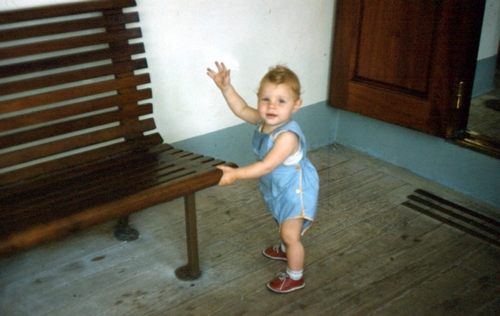
I was always glad to go down to our cabin to assure myself that Peter was sleeping soundly in his cot. I did not want him to have to fight for attention, but to have his needs met when required. This was mostly quite easy. One evening he was crying and a man from a nearby cabin greeted us with severe criticism for leaving the child. I would have been glad to go to bed earlier and read or sew, rather than sit as an onlooker at the dances, but Bill would not hear of it, saying that it showed I cared more for the baby than for him. The realisation came that he was using this to make too many demands on me, but I was not yet ready to admit that my marriage was not as happy as I had expected. I thought perhaps I had been unrealistic. Not all the marriages of my friends and cousins were blissful, but they generally made the most of it. Had I made the situation worse by letting Bill have his own way in so many things? Was this pretty normal in a marriage? I tried to "give and take ", at times feeling I was doing most of the "giving". Perhaps.
At Singapore it was dusk by the time we had got our passports stamped and were ready to go ashore. In a trickshaw (a half bicycle and two-wheeled cart) we proceeded as we thought to the Post Office, passing a strange mixture of eastern and western buildings, modern trains and flats, old slum tenements with French windows all open and washing hanging in front, rows of little shabby shops with brightly painted signs, picture theatres, Chinese temples, a huge police station, traffic lights, until we came to a shop like a street stall where our driver stopped for us to go shopping. Peter was beginning to cry so I gave him his bottle and wheeled him in the pram while Bill looked around at shirts, thongs, trousers, materials. Bill bought a tripod for £5/10 which he said was for our second wedding anniversary. He was interested in flash guns for his camera, but I was fully occupied trying to get Peter to sleep. We went back to the ship by taxi for 10/- with Peter absolutely exhausted about 11pm. Bill wanted to go back to the "Southern Cabaret", but I refused.
Colombo, Ceylon (now Sri Lanka) was also a mixture of East and West. Modern cars and bullock-drawn wagons, rickshaws (real ones pulled by a man). Women washing clothes in dirty water and spreading sparkling clean clothes on grass to dry, often wearing saris with gold rings in their ears and some with gold clips through one nostril, mostly barefoot. For the first time in my life I was confronted with beggars and abject poverty to which I saw no solution. A few coins would only prolong their misery. When we came to pay the taxi we found that the £2 quoted was sterling, British Currency. I was learning about foreign currency and foreign practices.
Volcanic hills hemmed in Steamer Point at Aden, jagged and barren but attractive from a distance. We walked down the narrow winding road past camera shops. I had been sick the previous day and again in the morning and felt faint with heat. We turned down a side road past tiny shops jammed together and crammed with a great variety of goods, stalls and tables in the streets. Little girls carried babies, many women had their faces covered, some European women drove cars. I was glad to get back to the ship even though I didn't like the movement.
At the entrance to the Gulf of Suez was a completely barren eroded mountainous island. The Peninsular of Sinai, also mountainous, was half hidden by heat haze. As the ship entered the canal we were just getting up next morning. The land on our right was completely barren with nothing more to see but occasional workers' huts for canal maintenance. On the left were numerous huts and people and parts were irrigated and green with date palms. The 100 mile long Canal fascinated me. Our ship was about the middle of a convoy going through, small craft could pass going in the opposite direction, the "Fairsky" could not. In Great Bitter Lake we stopped to let another convoy pass going south.
During the afternoon I came on deck to see a large ship anchored in what appeared to be sand, then I saw another behind, and more and more until I realised they were in a bypass canal waiting to go south. A road ran alongside the canal and Cairo excursion buses followed the canal to Port Said, where we arrived after dark. About a dozen launches drew alongside, and a few passengers embarked, police officials and luggage, also a large launch with sacks of food for the kitchen. Near our stopping place were dozens of little boats of colourful Egyptian leather goods, poufs (leather cushions for use as seats), camel stools, bags and thongs. Again there was nothing that tempted me but Bill bought an overnight bag, a photo album, a hand bag and a pair of thongs. The thongs soon fell to pieces, the overnight bag didn't last much longer.
Towards the end of the trip I began to suspect that I was again pregnant. But I knew Bill would be so annoyed and blame me. One baby he tolerated so long as I was able to do things he wanted without delay - but two! I knew that would not fit with his plans for seeing the world and making his fortune. At present it was wisest not to say anything until I had seen a doctor.
A month after leaving Sydney we were approaching Italy. Salerno was quite a large town with signs of Roman viaducts, modern flats and tiny huts perched on the steep hills. Some big buildings in quite impossible places, tiny spots of sand between rocky cliffs, a large castle or monastery on the very top of the highest mountain. My first glimpse of Europe! At last! I savoured it.
At Naples Bill looked for his family on the wharf, although they had mentioned nothing about meeting us. After dinner we went ashore to go on a bus tour of the city (on the wrong side of the road). At the top of the hill we stopped to look at cameos and music boxes playing "Isle of Capri", "Come Back to Sorrento", or "Santa Lucia", all familiar songs. Passing rooms with the doors open for fresh air, we could see families apparently living in one room and washing on lines from the windows. Seeing some of these ports I began to realise the impact of overcrowded cities and population pressure.
Early next morning we met a travel agent who arranged to make our bookings for that night in Naples, a trip to Capri the next day and Rome the following night. We took only one suitcase, one overnight bag and the stroller, leaving the rest for the agent to send to Freiburg, Germany. Then we went by local train to Pompeii past small market gardens, new flats, old ruins.
I had known that Pompeii was buried in 79 AD, excavations began years later (1755). The whole concept staggered me. It was so enormous, the history written in stone so fascinating, my first such experience.
The "roads" were extremely rough, just large stones worn unevenly, not made for prams. Near the entrance was a museum with a huge wheel, fragments of vases and urns, cooking and household utensils, the curled up body of a man, covering his face with his hands, a dog apparently twisting in agony, tiny statues.
There were two amphitheatres, a small one and the Grand Theatre, where I fed Peter a can of baby food, saved from the ship. A stage of steel work was being built over the original stage. It could accommodate 5,000 sitting on marble seats in a semicircle. Next door was the school of Gladiators where they were trained in the use of the sword, dart and shield.
In the direction of Mt Vesuvius we came to the House of Vetti, among those in the best state of preservation with rich decorations representing the better known mythical subjects. Archaeology had long interested me but Pompeii was an unexpectedly gripping experience.
After hours of walking we were VERY hot and thirsty and an orange drink at the refreshment room was much appreciated if expensive. Then we proceeded to the station to catch a train back to Naples.
All our washing was hanging around the room, to get some nappies dry. A kind of doughnut and grapes were all we could find to eat. I bathed Peter in the "foot bath" or was it a bidet? and put him down to sleep but he fell off the bed and I had to settle him again.
Next day we went to Capri, the romantic setting for a song " ‘Twas on the Isle of Capri that I met her", popularised by Frank Sinatra in my childhood and often played at dances. As soon as we disembarked we were shown to a smaller launch carrying about eight, in which we went around the island towards the Blue Grotto. Peter fell asleep in my arms, and grew heavy as I tried to keep the hot sun off his face.
At the Blue Grotto we got into small rowing boats (three passengers) and about twenty boats entered the cave via a tiny hole, first being pulled in by a rope as there was no room for oars. It was smaller than I had imagined but very blue and pretty when the rower splashed his oars. It was a brief visit. The tour included a meal, a kind of pancake and tomato sauce, chicken, ice-cream and a bottle of mineral water. Peter threw his bottle of milk onto the marble floor and broke it. It cost 1/- to go to toilet for men or women. I went but Bill decided to wait, maybe find an opportunity free of charge.
Then the bus took us to Capri where some went shopping and we had another walk along a narrow street to the other side of the island, highly developed and fashionable. It was very hot and again hard pushing the stroller and very commercialised.
After collecting our luggage from the Naples hotel and paying the bill 3,500 lire (about £2 10) for a large clean room with hot and cold water, but no breakfast, no washing facilities, no lifts, we caught the train about 8pm and managed to get Peter to sleep quite soon as he was terribly tired. Arriving at the large modern terminal of Rome, we caught a taxi to the City Pension, which appeared closed but a porter in uniform opened the door and showed us up quite a few steps and along dark corridors to Reception. The whole building was very dark, the tap in our room leaked and some lights did not work. We pushed the twin beds together and I got Peter to sleep again and draped the washing around the room. Bill went and bought us ice creams which was all he could find to eat. Luckily we had had a good meal on Capri.
Next morning I bathed Peter in "foot bath/ bidet", we had breakfast of a cup of coffee and a couple of slices of bread and jam, packed our luggage which we left at the railway and set out for St Peters, going past many old buildings of every century, and finally across the Tiber. St Peters was set at the back of a very large public "square", almost a circle enclosed by two curved "arms" a roof supported by hundreds of columns with weather-beaten statues on the top. The interior of the cathedral was such a contrast to the rather faded exterior. It was very ornate, much gold work, carvings, paintings and other decorations in a variety of marble and other stone. It was full of tourists and worshippers, all rather dwarfed by the huge proportions. There was such a lot to see, so new to me and rather overpowering.
Before hurrying back to the tourist bureau I converted the stroller to a pram so that Peter could lie down and sleep. Bill took the pram and pushed it more quickly down the gutter, jerked it and Peter slid out the back which of course upset him. I consoled him and took the stroller. We finally caught a taxi and went on a city tour. Peter was very tired and difficult but could not sleep. Then we looked at the Colosseum which did not disappoint. The top crumbling walls were being repaired in brick so as to preserve the building. The floor had disappeared but the dressing rooms beneath could still be seen and of course the cats!
We left Rome in the evening by train, had a compartment to ourselves and Peter and I slept on one side, Bill on the other. As we entered Switzerland during the night we had to wake up to show our passports. Next morning we stopped at Lake Lucerne and Zurick. At last we were in Switzerland, but where were the picturesque, towering mountains? We saw none of it from the train.
On arrival in Freiburg, Germany I wore my best mauve winter dress with the white angora collar and Peter wore his new blue shepherd suit which I had been smocking on the ship. We found the apartment, in the front of a large block of identical post-war buildings, the only distinguishing feature being the colour of the cement-render - pale green, blue, grey, brown or yellow. We rang the bell in the street, Bill's mother hurried down and took us up to the second floor. Everyone went to a lot of trouble to make us welcome. Vati showed Bill the car, an Opel.
There were hugs and kisses and tears from Mutti. My lack of conversational German didn't matter. In any language one could feel the effusiveness of her delight and the cordiality of Bill's stepfather's greeting. Bill's half-sister and half-brother, Uschi and Helmut, aged twenty-two and eighteen, who normally shared the second bedroom, moved into the lounge room to give us their bedroom, so that we could have some privacy. Our beds were along one wall, head to toe, but each bed was larger than average. Obviously the household would only function with a strict routine. It was also obvious that Mutti was a diligent Hausfrau and that Vati was fastidious. Everything was immaculate.
I hung some of Peter's washing on the balcony, but soon realised it would never dry, only freeze. There was an attic for hand washing. Everything else went to the laundry.
Bill was the only smoker. Things such as ash trays and clothes could not be left around. I had to keep an eye on Bill's ash trays as he was casual about such matters. Also an inquisitive toddler, used to the outdoors and plenty of space was a problem.
There was some suggestion about Peter being christened and Bill said no, especially as I was not a Catholic. Everyone they knew was Catholic, although few attended church. It astounded them that I was not. What else was there?
Mutti took Peter on her knees, jigged up and down and sang
"Hoppe hoppe Reiter (Hop hop rider)
Wenn er fällt dann schreit er. (If he falls he will cry)
Fä;llt er in die Graben, fressen ihn die Raben (If he falls in the ditch the crows will eat him)
Fällt er in den Sumpf, dann mach der Reiter Blums" ?? (If he falls in the swamp he will go bump)
at which point she spread her knees for him to fall through. He laughed hilariously.
She rushed off to town and bought him a whole wardrobe of German-type clothes and proceeded to puree all his food and put it in a bottle, although he had been eating solids for some months. I had to make her realise that I had made almost all the things he needed and his routine was not to be changed. He was obviously thriving and I felt quite successful as a "natural" mother. The German way was "high tech", "modern" and to me inflexible. We compromised and most of the clothes were taken back and exchanged for a really warm jacket which he lacked.
"When I'm home I'll take over the care of the baby and Dorothy can relax and put on some weight," offered Mutti who was well rounded. She worked at the telephone exchange doing shift work and occasionally an evening shift.
A day or two later Bill and I went in the car (driving on the wrong side of the road) up to Bonndorf, Bill's birthplace, high in the Black Forest. Bill drove, I kept Peter occupied and safe. (These were pre-seat-belt days). We were to visit his Tante Gret and Onkel Willi who still lived there with their teenage son, Horst who was mostly away for his final years of school. They lived in the family home, a semi-detached house. It had a cellar, containing the laundry, living rooms on the ground floor, bedrooms upstairs, a small improvised "modern" bathroom on the landing and an attic room. Both Mutti and Tante Gret had very tiny fridges, of cupboard height. In her cellar Tante Gret had barrels with preserved sauerkraut, carrots and potatoes and many jars of various preserves from the garden. There was quite a large garden adjacent but in autumn most of the crops were already harvested, although there was still kohl rabi which I enjoyed.
Immediately I was entranced by the village and felt comfortable with the family. Bonndorf was beautiful. Like other villages which I saw, it had its village bell. Peter loved the visit. Tante Gret was a warm but not effusive "Hausfrau", Onkel Willi, who was obviously a considerate husband, worked as a compositor for the local printery, was in the village choir and played the violin. He was an immediate hit with Peter and Peter with him. They insisted that Bill translate conversations for me. They would have known everyone in the village. After a beautiful home-cooked dinner, Bill, who had other relatives there and still knew a number of villagers, enjoyed socialising but I was reticent. I could not understand the Black Forest dialect at all. During our visit Bill entertained his old school friends and other people he knew with tales of his experiences and life in Australia. I gave up trying to follow these conversations and entertained Peter instead. At one place, someone tried to include me by asking me how many teeth Peter had, speaking slowly in Hochdeutch. I understood the question. The answer was "Zehn Zahne", "Ten teeth", but I stumbled over it as both words are pronounced almost identically (tse:n tse:na ), which I thought must be wrong. In this village was the commercial laundry where all our linen came once a month to be washed and dried. Bill's Tante Marianni came to Freiburg, collected our dirty linen and brought back the clean linen. This and many other things amazed me.
A lovely day in the famous Black Forest and lovely people but much to confuse and surprise.
Mutti's brother Georg in Freiburg, who was quite well-to-do and owned his own business where Vati worked, had a comparatively large house for his wife Bertl and three young adult children. When we visited them they took us out to dinner which was a common custom, rather than entertain at home. Very few people owned their own homes with a yard. Families were usually very small, "only" children were common. Anyone who could afford land usually built a house for at least two families, which was far more practical financially to build and to heat. Bonndorf was "out of date" to people from Freiburg. The "advances" of the city were in contrast to the "backwardness" of a village where cows were still housed in the same building as people and Tante Gret's garden was passé.
Employees had a long break at midday and came home for the midday meal, "Mittagessen". I usually fed Peter first, mashing his vegetables and chopping his meat very fine. Then he played while we ate. It began with soup, a stewed or casserole dish with vegetables, mainly bottled or preserved beans and carrots and lentils all brought to the table in separate dishes. Each was cooked in its own sauce, which often came from a packet. We served ourselves. Sweets were rare. As soon as we had eaten and the meal cleared up, I retired with Peter to our room where he had his afternoon sleep and I knitted and sewed and attended to him so that he did not disturb anyone.
The evening meal "Abendessen", was usually rye bread, a selection of cold meats arranged on a platter, gherkins, pickled onions and a variety of cheese. I selected what was suitable for Peter. I had not been prepared for the lack of fresh fruit and vegetables. The tea was always black and very weak. Then I put Peter to bed for the night.
"When would you like to give me the rest of the money for your car?" asked Vati. "Then I can put it into your name and we are square."
Suddenly we realised that the car he had bought for us had cost more than we had actually sent, although less than the sum Bill had originally mentioned. Vati declined to let Bill have the car until it was paid for as he had borrowed the amount lacking and was now embarrassed at being in debt for the first time in his life, apart from "key money" to buy the apartment. I could understand his feeling about the debt, but we had no money left. He was very angry at having been put in that position. I kept my feelings to myself but it was obvious we would not be welcome to stay indefinitely. I could not wait to get away.
For two weeks we wondered what to do. Finally Bill found work nearby and I began to resign myself to living in a single room, at least for a few weeks until we had saved some money. The fourth day after Bill started work, it began to snow even though this was only autumn. He came home very disgruntled and complained of a bad back and claimed Social Security.
The doctor I consulted confirmed that I was pregnant! Mutti suggested that Bill should have been more responsible and they argued. Bill wanted me to get an abortion and I refused but after a week or two of his badgering, I told him to find someone who would perform it and I didn't hear it mentioned again.
Mutti said the car would be sold tomorrow, so when Peter woke we went for our last drive. Bill wanted to go to a nearby ski area but only "down" traffic could use the road at that hour and the morning's sunshine was fading, rain was threatening. So we returned to town for window shopping.
There were no buyers for the car at the asking price although Vati took the day off work to see the dealers. Finally he said we could use the car and repay him when we left. It would remain in his name. This was a blow, especially to Bill who had such unrealistic aspirations of touring around.
When we went for a drive it was better to take our food with us as all the cafes were too expensive, with tablecloths and music. We found no kiosks, cafeterias, milk bars or greengrocers. Any fruit available in grocery shops was imported and very expensive.
I got out the correspondence books, showed them to Mutti and Bill began to spend some time on them. I helped him with the exercises. Those we sent away came back with good marks in elementary arithmetic.
One day Mutti and I took Peter and Frank, the neighbour's boy, six months older, to a park. Mutti gave each of the boys a peeled apple as a treat. Frank held his all the way, he had no idea what to do with it. Peter immediately began to use his few teeth to nibble, although I would never have given him a whole apple, especially sitting in a moving stroller. When we got there, there was nowhere for the boys to run or play. The signs all said "Keep off the grass." This surprised me. It was not a park for play, only for show. There was an obvious but to me unexpected formality.
Mutti was too busy and the apartment too crowded to have visitors very often. I quickly developed a great weakness for expensive cheese cake while in Germany as Mutti sometimes bought such cakes when visitors were expected. I also enjoyed coffee, especially if it was brewed. I had expected we would have some kind of Wiener Schnitzel as George's mother used to make, but we did not as it was too expensive and time-consuming to prepare. One day Mutti cooked a piece of mutton thinking I would like it, but I had never eaten such fatty and old mutton. They obviously never had lamb and did not have a griller of any sort.
As the winter came closer, the choice of vegetables became further reduced, more dried vegetables were used. Meat was comparatively expensive. This should not have surprised me but it did. Luckily strange food did not revolt me.
As the weather got colder I was surprised that Mutti continued to open all the windows wide on her housework day. The bedding was put over the window sill if it wasn't raining, the clothes taken out of the wardrobe, brushed and aired. Indoors the usual temperature was pleasantly warm, but I realised a home with well-fitted windows could not be closed up for the winter without regular airing. Buildings in this climate were naturally better insulated and more solid than in Australia, but still heating costs were great and so was suitable clothing.
NEXT >>




